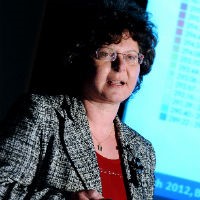 The upcoming CASE Open Lecture will be given by Professor Maria Kolokotromi from Brunel University. Her talk entitled ‘Urban Heat Island: it’s impact on energy demand by buildings’ will be given on Tuesday 28th February at 6PM in Marlowe Lecture Theatre 1.
The upcoming CASE Open Lecture will be given by Professor Maria Kolokotromi from Brunel University. Her talk entitled ‘Urban Heat Island: it’s impact on energy demand by buildings’ will be given on Tuesday 28th February at 6PM in Marlowe Lecture Theatre 1.
Maria Kolokotroni is Professor in the Department of Mechanical Aerospace and Civil Engineering, College of Engineering, Design and Physical Sciences at Brunel University London and she leads the theme for Resource Efficient Future Cities in the Institute of Energy Futures. Professor Kolokotroni studied Architectural Engineering at the National Technical University of Athens and University College London. She carried post-doctoral studies in the field of building ventilation and low energy cooling at the University of Westminster followed by five years with the Indoor Environment Group at the Building Research Establishment, UK. She is a Chartered Engineer (CEng), Fellow of CIBSE (Chartered Institute of Building Services Engineers) and member of ASHRAE (American Society of Hearing Refrigeration and Air Conditioning Engineers) and IE (Institute of Energy). She is a member of IEA (International Energy Agency) AIVC (Air Infiltration and Ventilation Centre) Board and currently participates to the international project ‘Annex 62 – Ventilative Cooling’ by the IEA EBC (Energy in Buildings and Communities). She has co-ordinated and participated to a number of UK, European and International projects on energy, low energy cooling and ventilation, urban heat island (quantification for London and its impact on energy demand by buildings) and mitigation strategies such as cool materials as well as the impact of climate change on the energy performance of buildings and urban areas.
The talk will focus on buildings and the city, and why the energy use differs from rural areas. It will describe the urban heat island of London as revealed by measuring air temperature across the city, its impact on building energy demand and what future adaptation measures might improve energy efficiency.
